for Loops with Setsmin And max with SetsYou can connect to Gradescope to take weekly graded quiz today during the last 15 minutes of the class.
Once you start the quiz you have 15 minutes to finish it.
You can only take this quiz today.
There is not makeup for the weekly quiz because Gradescope does not permit it.
I have posted a solution to homework 3 here.
Let's take a look.
I have posted homework 5 here.
It is due this coming Sunday at 11:59 PM.
if statements and while loops need boolean valuesWiliam Campbell (Bill)
if statement
if preferred:
preferred = "(" + preferred + ")"
if len(preferred) > 0:
preferred = "(" + preferred + ")"
x ∈ A
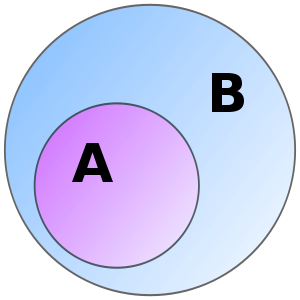
A ⊂ B
B ⊃ A
A ∪ B
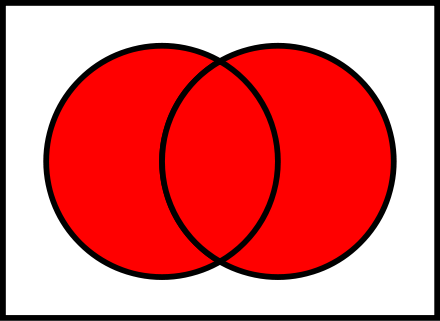
A ∩ B
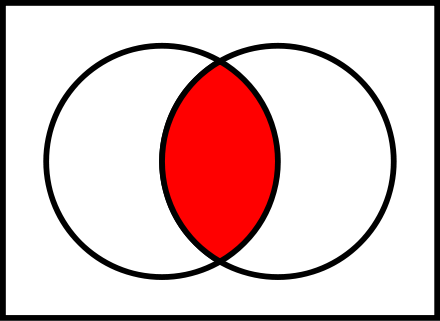
A - B
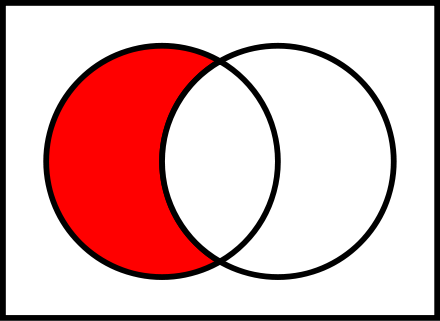
A Δ B
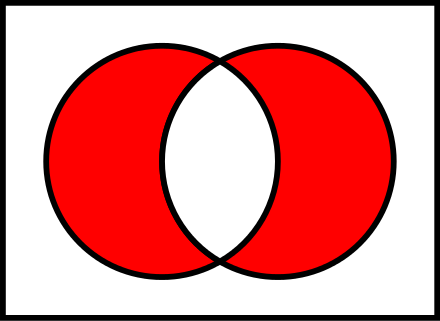
set functionset takes a single argument for loopset
>>> num_list = [1,2,3]
>>> num_set = set(num_list)
>>> num_set
{1, 2, 3}
>>> list_1 = [1, 2, 3, 4, 5] >>> type(list_1) <class 'list'>
>>> nonsense = {'foo', 'bar', 'bletch'}
>>> type(nonsense)
<class 'set'>
>>> empty = [] >>> type(empty) <class 'list'>
>>> empty = {}
>>> type(empty)
<class 'dict'>
set with no arguments
>>> set_1 = set() >>> set_1 set()
>>> set_2 = ()
>>> type(set_2) <class 'tuple'>
empty_set = set()
>>> empty_set set()
>>> s1 = set() >>> s1 set()
>>> s1.add(1)
>>> s1
{1}
>>> s1.add('two')
>>> s1
{1, 'two'}
>>> s1.add((3,3,3))
>>> s1
{(3, 3, 3), 1, 'two'}
>>> s1.add(1)
>>> s1
{(3, 3, 3), 1, 'two'}
>>> s2 = set()
>>> s2
set()
>>> s2.update([1, 2, 3])
>>> s2
{1, 2, 3}
>>> s2.update('foo')
>>> s2
{1, 2, 3, 'f', 'o'}
>>> numb_set
{1, 2, 3, 4, 5}
>>> numb_set.discard(2)
>>> numb_set
{1, 3, 4, 5}
>>> numb_set.remove(4)
>>> numb_set
{1, 3, 5}
>>> numb_set.discard(2)
>>> numb_set
{1, 3, 5}
>>> numb_set.remove(4)
Traceback (most recent call last):
File "<stdin>", line 1, in <module>
KeyError: 4
len function gives the size of a set
>>> s1 = {1, 2, 3}
>>> len(s1)
3
>>> s2 = {3, 2, 1}
>>> len(s2)
3
>>> s3 = {'one', 'two', 'three', 'four'}
>>> len(s3)
4
len function on each to get their size>>> list_1 = [1, 2, 3] >>> list_2 = [3, 2, 1] >>> list_1 == list_2 False
>>> s1 = {1, 2, 3}
>>> s2 = {3, 2, 1}
>>> s1 == s2
True
>>> tuple_set = {(1,2), (3,4), (5,6)}
>>> tuple_set
{(5, 6), (1, 2), (3, 4)}
>>> list_set = {[1,2], [3,4], [5,6]}
Traceback (most recent call last):
File "<stdin>", line 1, in <module>
TypeError: unhashable type: 'list'
>>> a, b, c = 1, 2, 3
>>> A = {a, b, c}
>>> A
{1, 2, 3}
>>> a = 5
>>> A
{1, 2, 3}
for Loops with Setsfor loopfor loop looks like this
for LOOP_VARIABLE in ITERABLE_OBJECT:
STATEMENT
...
>>> s1 = {1, 2, 3, 4, 5}
>>> for number in s1:
... print(number)
...
1
2
3
4
5
>>> s2 = {'one', 'two', 'three', 'four', 'five'}
>>> for number in s2:
... print(number)
...
two
five
three
one
four
>>> list_1 = [1, 2, 3, 4, 5] >>> for number in list_1: ... print(number) ... 1 2 3 4 5 >>> list_2 = [5, 4, 3, 2, 1] >>> for number in list_2: ... print(number) ... 5 4 3 2 1
in
operator
>>> list_1 [5, 4, 3, 2, 1] >>> 7 in list_1 False >>> 5 in list_1 True
in operator to test whether a value is a
member of a set
>>> s1
{1, 2, 3, 4, 5}
>>> 7 in s1
False
>>> 8 in s1
False
>>> 3 in s1
True
not in operator
>>> 8 not in s1 True >>> 3 not in s1 False
not in are two words, it is a single operatorA ∪ B
>>> A = {1, 4, 8, 12}
>>> B = {1, 2, 6, 8}
>>> A.union(B)
{1, 2, 4, 6, 8, 12}
A ∪ B
B ∪ A
>>> B.union(A)
{1, 2, 4, 6, 8, 12}
>>> A | B
{1, 2, 4, 6, 8, 12}
>>> B | A
{1, 2, 4, 6, 8, 12}
A ∩ B
>>> A
{8, 1, 12, 4}
>>> B
{8, 1, 2, 6}
>>> A.intersection(B)
{8, 1}
A ∩ B = B ∩ A
>>> B.intersection(A)
{8, 1}
>>> A & B
{8, 1}
>>> B & A
{8, 1}
A & B == B & A
True
A that are
not in B
A - B
>>> A
{8, 1, 12, 4}
>>> B
{8, 1, 2, 6}
A.difference(B)
{12, 4}
A - B ≠ B - A
>>> B.difference(A)
{2, 6}
>>> A - B
{12, 4}
>>> A - B == B - A False >>> A - B != B - A True
A Δ B
>>> A
{8, 1, 12, 4}
>>> B
{8, 1, 2, 6}
>>> A.symmetric_difference(B)
{2, 4, 6, 12}
A Δ B = B Δ A
B.symmetric_difference(A)
{2, 4, 6, 12}
A ^ B
{2, 4, 6, 12}
>>> A ^ B == B ^ A True
>>> A = {1, 2, 3, 4, 5, 6, 7, 8, 9, 10}
>>> B = {1, 3, 5, 7, 9}
>>> A.issubset(B) False >>> B.issubset(A) True
>>> A <= B False >>> B <= A True
>>> A.issuperset(B) True >>> B.issuperset(A) False
>>> A >= B True >>> B >= A False
>>> odds = {1, 3, 5, 7, 9}
>>> evens = {2, 4, 6, 8, 10}
>>> evens.isdisjoint(odds)
True
>>> odds.isdisjoint(even) True
>>> D = {1, 2, 3, 4, 5}
>>> D
{1, 2, 3, 4, 5}
>>> D.clear()
>>> D
set()
min And max with Setsmax built-in function
>>> B = {1, 3, 5, 7, 9}
>>> max(B)
9
min function
>>> min(B) 1
emails_1 = []
emails_2 = []
for line in email_file_1:
emails_1.append(line.strip())
for line in email_file_2:
emails_2.append(line.strip())
emails_new = emails_1[:]
for email in emails_2:
if email not in emails_new:
emails_new.append(email)
$ ./merge_emails_1.py Email file 1: emails_1.txt Email file 2: emails_2.txt List 1 Glenn.Hoffman@umb.edu big_bill@hotmail.com larry.wall@gmail.com timsmith@yahoo.com bigorangeshithead@whitehouse.gov List 2 Glenn.Hoffman@umb.edu alanh@hotmail.com timsmith@yahoo.com davidm@mac.com billybob@cs.umb.edu Merged list Glenn.Hoffman@umb.edu big_bill@hotmail.com larry.wall@gmail.com timsmith@yahoo.com bigorangeshithead@whitehouse.gov alanh@hotmail.com davidm@mac.com billybob@cs.umb.edu
emails_new = emails_1.union(emails_2)
>>> it244 = {"01459659", "00709552", "01565798", "00974687", "01357397", "01107434",
... "01516157", "01470962", "01015502", "01283749", "01313387", "01113342",
... "01684609", "01018750", "01458680", "01530289", "01600144"}
>>> it116 = {"01276750", "01246473", "01146053", "01361550", "01330451", "01405338",
... "01240592", "01328324", "01393077", "00822499", "01158165", "01342910",
... "01559794", "01293714", "01352486", "01367216", "01165111", "01617531",
... "01485027", "01397047", "01459659"}
>>> a = 01684609
File "<stdin>", line 1
a = 01684609
^
SyntaxError: invalid token
>>> it244.intersection(it116)
{'01459659'}
>>> all_students = it244 | it116
>>> len(it244) 17 >>> len(it116) 21 >>> len(all_students) 37
>>> athletes = basketball | baseball
>>>report_needed = all_students & athletes
>>> report_needed
{'01146053', '01015502', '01367216', '01330451'}